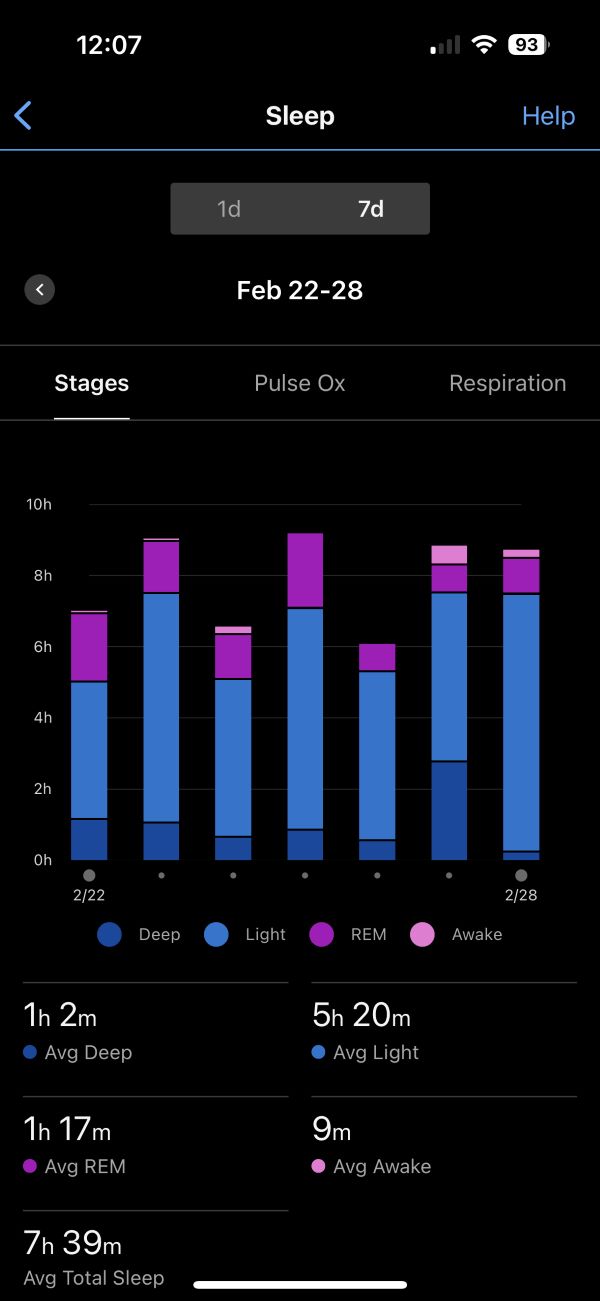I’m surprised by how quiet this thread is. It’s a great topic and very low hanging fruit. As a female athletes in my 50s, sleep is a big priority. Even back in my 40s when I was doing well with full Ironmans and the training, I always tried to get at least 7.5-8 hrs per night. Now I get at least 8 hours, sometimes 9 hrs if I can motivate myself to get into bed earlier. No reason I can’t. But I make sure I also have some downtime at night to read or watch movies or just catch up on other things on the sofa off my feet (and hanging out with my husband). I also wake up around 6-6:30am to swim in my basement as opposed to 4-4:30am when I swam the lap pool. I feel so much better not getting up so early in the mornings. It’s a luxury I fully appreciate.
I work a full-time remote desk job. Even in my second month of Ironman training I’m doing much less hours of training compared to you Dev (10-12hr now and will probably peak at 18 hrs depending on what my coach gives me). Too much volume for me is not sustainable but everyone is different. I do a lot more mobility work now and other stretching/strength/prehab work.
I actually know triathletes who are tired, fatigued, and run down at the moment. And then I learn they are getting up at 3am or 3:45am to get to a gym, pool, or do their training. I’m no expert but sleep is gold to me. I feel better with more sleep and a bit less training in the early mornings. It probably feels counter intuitive for some athletes to train less and sleep more, but I guess you don’t really learn it until you burn out or just get older and realize it’s a must.
Part of the appeal of IM training for me is the sleep. When I’m training, I sleep better and I sleep a lot. I’ll average over eight hours per night plus at least an hour of reading in bed before shutting off the lights. On weekends, I can easily go over nine hours. The difference between a workout on a good night’s sleep versus a poor one is night and day, so I rarely sacrifice sleep. I’m fortunate enough to be indifferent to my job, which offers a lot of flexibility, so I don’t have to get up in the small hours of the night to train before work. In general, I’m up a little before six and in bed, if not always asleep, by nine. Work, family, train, sleep- that’s about it. Does that make me boring as hell? Yes, but that’s the life.
FWIW, in the course of training for an IM I’ll average ~13 hours with the last two months closer to ~17 hours. I’m about to turn 50.
That all sounds like a great formula. I’m similar that my remote job is flexible for mid-day training for the second workout. I can run or do a trainer ride in the afternoons or lunchtime and then get back to my desk. And weekends are structured for more sleep as well.
Summer there are a few exceptions. I am going to go back to doing my long runs before work in the summer so I’ll get up a bit earlier, to be back at my desk by 9-9:30am. I discovered I don’t enjoy doing both long bike and long run on the weekends. I get burnt out quickly doing that. And once in a while i might get up early to do a sunrise swim at one of the local reservoirs but I’m in bed by 8am while it’s still light out. We are lucky to have our Endless Pool and a pristine mountain pond 2 miles from my doorstep for when I want to get up at 6:30am, mtn bike to the pond, do my swim workout, bike home and start work.

